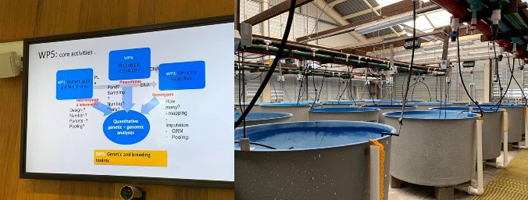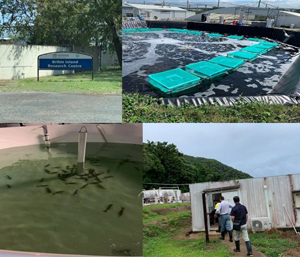![The GTIS team Dr. Adelaida T. Calpe and Dr. Arturo O. Lluisma with Dr. Herman Raadsma, RHAPB World Package (Genomic Prediction) Leader and Dr. Mehar Khatkar, Senior Researcher at the University of Sydney (Image credit: Dr. Adelaida T. Calpe, Inland Aquatic Resources Research Division [IARRD], PCAARRD)](/images/stories/2017/img081619_GTIS01.jpg) The Philippine Council for Agriculture, Aquatic and Natural Resources Research and Development of the Department of Science and Technology (DOST-PCAARRD) and the Marine Science Institute of the University of the Philippines Diliman (UP-MSI) visited the Research Hub for Advanced Prawn Breeding (RHAPB) in Townsville, Australia on March 18-24, 2019.
The Philippine Council for Agriculture, Aquatic and Natural Resources Research and Development of the Department of Science and Technology (DOST-PCAARRD) and the Marine Science Institute of the University of the Philippines Diliman (UP-MSI) visited the Research Hub for Advanced Prawn Breeding (RHAPB) in Townsville, Australia on March 18-24, 2019.
RHAPB is a research consortium organized by the Australian Research Council (ARC) whose goal is to boost the production capability of Australia’s prawn (P. monodon) farming industry.
It particularly aims to develop genomic technologies and resources considered as pivotal to improved prawn breeding. This leads to the most advanced and industry-transformative improvement program for any prawn species globally.
Funded by ARC, RHAPB implements the following projects focusing on specific genomic technologies:
1. Black Tiger Prawn Genome - prawn sequencing and annotation;
2. Development of Genomic Resources - identification of genomic markers and development of genotyping technologies; and
3. Genetic parameters and Genomic prediction - computational resources for predicting production-relevant phenotypes from genomic information.
Technologies developed by RHAPB are the major interests of the Global Technology and Information Search (GTIS) team composed of Dr. Adelaida T. Calpe of the Inland Aquatic Resources Research Division (IARRD) of DOST-PCAARRD and Dr. Arturo O Lluisma of UP-MSI.
 The team met with RHAPB Director Dr. Dean Jerry; RHAPB Deputy Director Dr. Kyall Zenger; University of Sydney Senior Researcher Dr. Mehar Khatkar; Researcher Dr. Roger Huerlimann; Researcher Dr. Herman Raadsma, and other RHAPB officials.
The team met with RHAPB Director Dr. Dean Jerry; RHAPB Deputy Director Dr. Kyall Zenger; University of Sydney Senior Researcher Dr. Mehar Khatkar; Researcher Dr. Roger Huerlimann; Researcher Dr. Herman Raadsma, and other RHAPB officials.
The team visited the University of Sydney; RHAPB laboratories in James Cook University; as well as the prawn hatchery, nursery, and grow-out facilities of Seafarms. The visit provided the team with valuable opportunities to gain greater appreciation and understanding of the technologies. It also forged partnerships that would facilitate the development and application of the technologies to rejuvenate the prawn farming industry in the Philippines.
Interest in a potential collaboration with Philippine researchers in implementing a similar research program on prawns in the Philippines was expressed by RHAPB researchers during the visit.
Technologies developed by RHAPB can be adapted to expedite the genetic improvement of prawn stocks. This can be done by targeting key traits relevant to the local aquaculture setting as well as genetic improvement of local prawn stocks in the Philippines.

